oxeye daisy
(Leucanthemum vulgare)
Conservation • Weed • Wetland • Description • Habitat • Ecology • Use • Distribution • Taxonomy
Description |
Oxeye daisy is an erect, perennial forb that rises on usually 1 stem from fibrous roots with short rhizomes. It can be 8″ to 24″ tall but is usually no more than 12″ tall. The stems are erect, hairless or inconspicuously hairy, usually unbranched, and angled. Basal leaves are spatulate or inversely lance-shaped with the attachment at the narrow end, ½″ to 2″ long, ⅓″ to 1⅛″ wide, but usually no more than 1⅓″ long and ¾″ wide. They are on leaf stalks that are ⅓″ to 4″ long but usually no more than 1⅛″ long. The margins usually have 3 to 7 lobes per side, with or without irregular teeth, or are unlobed and irregularly toothed. Stem leaves are alternate, and inversely lance-shaped, spatulate to lance-shaped, or linear. They are 1⅛″ to 3⅛″ long, and 1 ⁄16″ to 9 ⁄16″ wide, becoming smaller and fewer as they ascend the stem. Lower stem leaves are on short leaf stalks, the stalks becoming shorter as they ascend the stem. Upper leaves are stalkless. Margins of the mid-stem leaves are usually irregularly toothed around the entire margin. The upper and lower surfaces are hairless. The inflorescence is a single flower head on a long, slender stalk at the ends of the stems and branches. The flowers are 1″ to 2⅓″ wide, composed of 15 to 35 white ray florets surrounding a flattened, ¼″ to ¾″ wide disk of numerous yellow disk florets. The rays are ½″ to 1⅓″ long though usually no longer than ¾″, and are toothed at the tip. At the base of the flower head are several series of overlapping, green bracts with brown margins. The fruit is an achene. |
Height |
8″ to 24″ |
Flower Color |
White ray florets, yellow disk florets |
Similar Species |
Dog-fennel (Anthemis cotula) leaves are feathery, 2 to 3 times pinnately-divided, not lobed. The ray flowers are shorter, stubbier. Wild chamomile (Matricaria recutita) leaves are feathery, 2 to 3 times pinnately-divided, not lobed. The ray flowers are shorter, stubbier. |
Habitat |
Fields, pastures, disturbed sites. |
Ecology |
Flowering |
June to August |
Pests and Diseases |
|
Use |
|
Distribution |
||
|
Sources |
|
| 7/18/2024 | ||
Nativity |
||
Native to Europe, Turkey, and Georgia. Introduced and naturalized in North America. |
||
Occurrence |
||
Common |
||
Taxonomy |
|
Kingdom |
|
Subkingdom |
Pteridobiotina |
Phylum |
Tracheophyta (Vascular Plants) |
Class |
|
Order |
Asterales (Sunflowers, Bellflowers, Fanflowers, and Allies) |
Family |
Asteraceae (Sunflowers, Daisies, Asters, and Allies) |
Subfamily |
Asteroideae |
Supertribe |
Asterodae |
Tribe |
Anthemideae (Chamomiles, Yarrows, and Allies) |
Subtribe |
Leucantheminae |
Genus |
Leucanthemum |
Subordinate Taxa |
|
Two varieties have been described; the common nominate variety with deeply lobed leaves, and an uncommon variety with more entire leaves. However, the extremes appear to grade into each other. The varieties are not accepted by most taxonomists. |
|
Synonyms |
|
Chrysanthemum leucanthemum Chrysanthemum leucanthemum var. boecheri Chrysanthemum leucanthemum var. pinnatifidum Leucanthemum ircutianum Leucanthemum leucanthemum Leucanthemum vulgare var. pinnatifidum Leucanthemum vulgare var.vulgare Matricaria leucanthemum Pyrethrum leucanthemum Tanacetum leucanthemum |
|
Common Names |
|
common daisy dog daisy field daisy margriet marguerite marguerite daisy moon daisy ox-eye daisy oxeye daisy oxeye-daisy oxeyedaisy poorland-flower poorlandflower white daisy white-weed whiteweed |
|
Glossary
Achene
A dry, one-chambered, single-seeded seed capsule, formed from a single carpel, with the seed attached to the membranous outer layer (wall) only by the seed stalk; the wall, formed entirely from the wall of the superior ovary, does not split open at maturity, but relies on decay or predation to release the contents.
Pinnate
On a compound leaf, having the leaflets arranged on opposite sides of a common stalk. On a bryophyte, having branches evenly arranged on opposite sides of a stem.
Rhizome
A horizontal, usually underground stem. It serves as a reproductive structure, producing roots below and shoots above at the nodes.
Visitor Photos |
||
Share your photo of this plant. |
||
This button not working for you? |
||
Greg Watson |
 |
MinnesotaSeasons.com Photos |
||
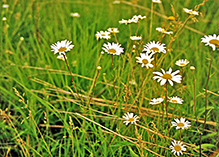 |
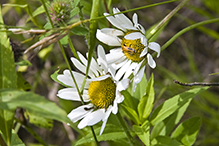 |
|
Plants |
Inflorescence | |
Flower head |
||
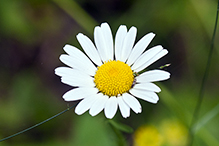 |
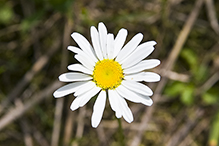 |
|
Flower head |
Flower head | |
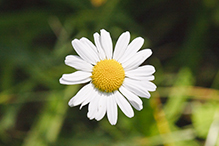 |
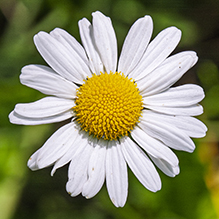 |
|
Flower head |
||
|
||
|
||
|
Flower head |
|
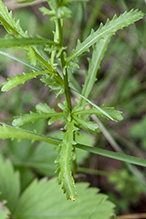 |
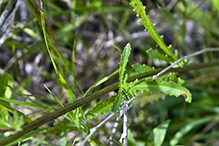 |
|
Leaves |
||
|
||
|
||
Leaves |
||

Slideshows |
Leucanthemum vulgare |
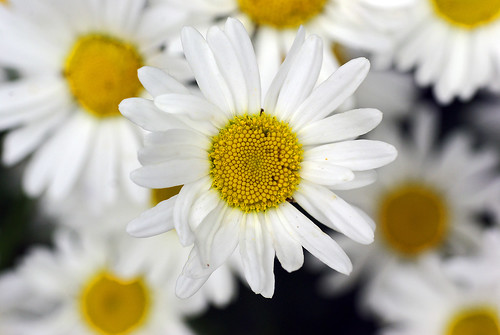
|
About
Prestekrage |
Leucanthemum vulgare |
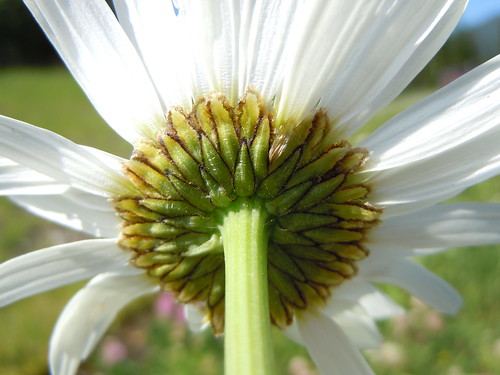
|
About
Also known as Chrysanthemum leucanthemum. Introduced rhizomatous perennial, leaves shallowly toothed or lobed, stems 20-80 cm tall, involucral bracts arranged in several series and each bract has a brown translucent margin, receptacle naked, common along roadsides and in pastures (nutrient rich sites). |
Oxeye Daisy (Chrysanthemum leucanthemum) |
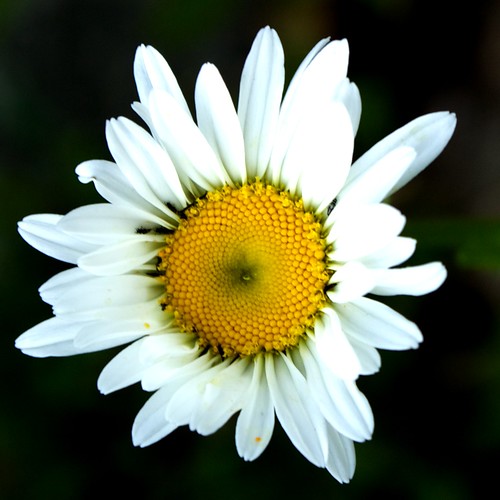
|
About
A very common wild flower in Vermont. |
Chrysanthemum leucanthemum pinnatifidum OXEYE DAISY |
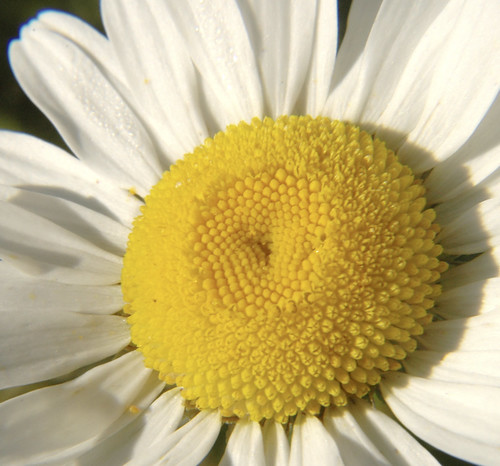
|
Plant portrait - Oxeye daisy (Leucanthemum vulgare) |
About
Published on Feb 27, 2014 A detailed look at the life cycle of Oxeye daisy (Leucanthemum vulgare). These images can help to accurately identify the plant during different seasons of the year. |

Visitor Videos |
||
Share your video of this plant. |
||
This button not working for you? |
||
|
Other Videos |
||
MyNature Apps; Identifying Oxeye Daisy, Leucanthemum vulgare |
About
Uploaded on Jun 11, 2011 How to identify an Oxeye Daisy, Leucanthemum vulgare www.mynatureapps.com |
Invasive Species - Oxeye Daisy (Leucanthemum vulgare) |
About
Published on Aug 24, 2012 This video is a first in my wildflower series, as it is the first invasive plant I have filmed and uploaded to my channel. I guess this illustrates my varying goals for posting these videos. Certainly part of the reason is identification and this is why I will document some number of invasive species before I am done. The oxeye daisy, though pretty, is a Eurasian species that heartily invades fields and meadows and displaces native grasses. |
Oxeye Daisy (Leucanthemum Vulgare) - 2012-06-03 |
About
Published on Jun 6, 2012 Leucanthemum vulgare, the oxeye daisy, (syn. Chrysanthemum leucanthemum). --------------- |
Leucanthemum vulgare |
About
Published on Jun 1, 2014 No description available. |
Large Skipper on Ox-eye Daisy - Rostfarbiger Dickkopffalter |
About
Uploaded on Jun 19, 2009 The male skipper (Ochlodes venatus) sat on the ox-eye daisy for ten minutes waiting for sunshine. When the sun reappeared his proboscis got busy. Der männliche Falter saß zehn Minuten lang auf der Margerite und wartete auf Sonnenschein. Als die Sonne erschien, wurde sein Rüssel fleißig. |

Visitor Sightings |
||
Report a sighting of this plant. |
||
This button not working for you? |
||
Greg Watson |
Location: Apple Blossom Overlook Park |
 |
MinnesotaSeasons.com Sightings |
||

|
Created: 2/24/2005 Last Updated: © MinnesotaSeasons.com. All rights reserved. |
